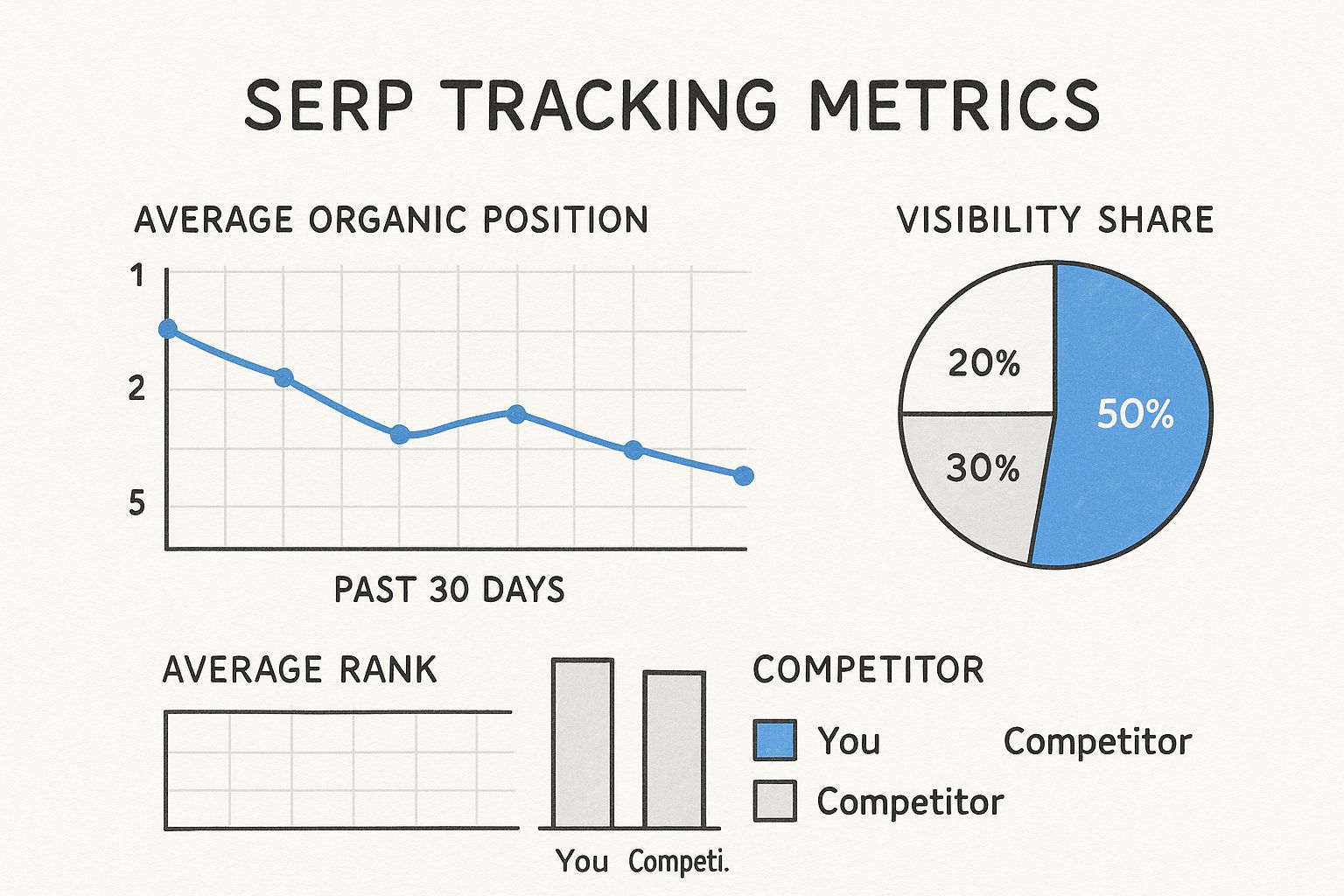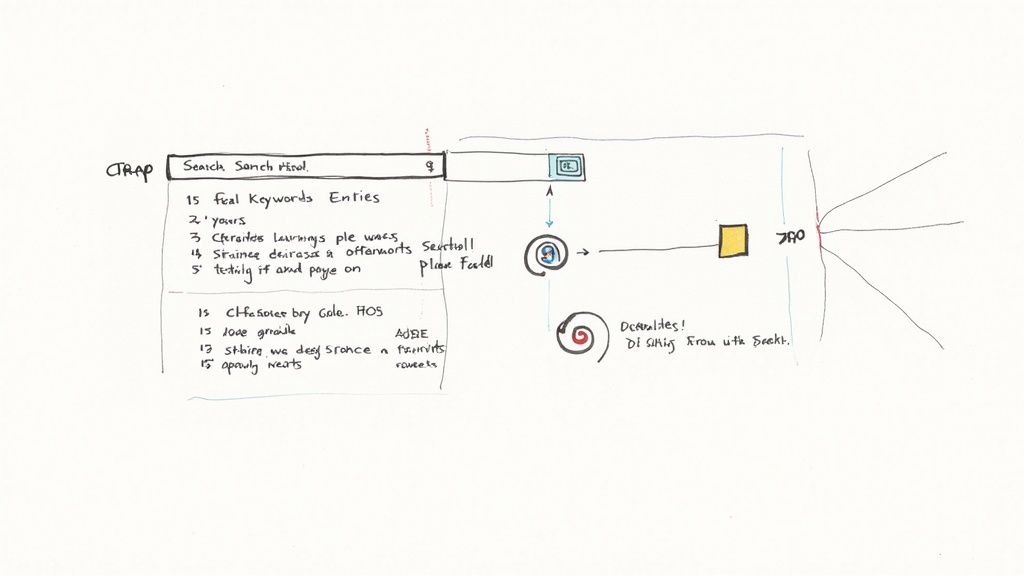Importance of Tracking SERPs: Boost Your SEO Growth Today

Maxime Dupré
10/21/2025

Trying to manage an SEO strategy without watching the Search Engine Results Pages (SERPs) is a bit like sailing a ship in a storm without a compass. It's not just a good idea; it's the absolute foundation of any successful digital plan. It gives you the live data you need to see what’s working, fix what isn't, and find new ways to grow.
Your SEO Compass: Why SERP Tracking Matters Most
Think of SERP tracking as your business's real-time dashboard for organic search. It tells you exactly where you stand, which way you're trending, and where your competitors are on the map. This isn't about chasing vanity metrics; it's about gathering actionable intelligence to make smarter, faster decisions. Without it, you’re just guessing.
At the end of the day, tracking SERPs comes down to two things: visibility and revenue. The way traffic gets distributed in search results is incredibly top-heavy. The very first organic position pulls in a massive 27.6% of all clicks. The second and third spots get around 13% and 10% each.
What's really telling is that less than 1% of people ever bother clicking to the second page. This means that even a small drop in your ranking can make you practically invisible to most of your potential customers. You can discover more insights about SERP click distribution on digitalsilk.com.
Visualizing Your Position on the Map
To really understand where you are, you need to see the data. Visualizing key metrics is a game-changer. The chart below shows things like your average organic position, how you stack up against competitors, and your total share of visibility.

Looking at it this way immediately highlights performance trends and competitive pressure, turning a pile of abstract numbers into a clear, strategic picture.
SERP data is more than just a report card for your SEO team. It's a direct reflection of consumer intent and market dynamics, offering crucial insights that can guide high-level business strategy.
How SERP Position Impacts Your Website Traffic
Here's a quick overview of how much traffic you lose with each drop in Google's search rankings.
| SERP Position | Average Click-Through Rate (CTR) | Impact on Visibility |
|---|---|---|
| Position 1 | 27.6% | The lion's share of clicks and brand exposure. |
| Position 2 | 13.0% | Traffic drops by more than half from position one. |
| Position 3 | 10.0% | Still on the podium, but a significant decline. |
| Position 5 | 6.3% | You've lost over 75% of the potential top-spot traffic. |
| Position 10 | 2.5% | Barely hanging on before the second-page abyss. |
As you can see, every single spot matters. A small slip can have a massive impact on your bottom line.
SERP Data as Competitive Intelligence
Beyond just tracking your own site, monitoring the SERPs is your best tool for competitive intelligence. Keeping an eye on your rivals' movements allows you to:
- See which of their keyword strategies are actually working.
- Find gaps in their content plan that you can exploit.
- Reverse-engineer their successful tactics to sharpen your own approach.
This proactive mindset lets you lead the market instead of constantly reacting to it. Understanding what is competitive intelligence is the first step toward turning raw SERP data into a powerful offensive weapon for your business.
Ultimately, ignoring your SERP positions means you're ignoring your most valuable source of customers and direct market feedback.
Measuring Real SEO Performance and ROI

Let's be honest: how do you prove your SEO efforts are actually paying off? Without solid data, you're just reporting on activities, not outcomes. Tracking the SERPs is what gives you the hard evidence to measure success, justify your budget, and show a clear return on investment.
Think of SERP tracking as a financial health monitor for your website. It goes way beyond just looking at rankings and gives you a direct line of sight from a keyword moving up a few spots to real, measurable business growth.
From Rankings to Revenue
Vanity metrics, like hitting #1 for a specific keyword, feel great, but they don't directly pay the bills. The real magic of tracking SERPs is tying those rankings to tangible business results.
When you see a target keyword jump from page two into the top three, you can draw a straight line from that improvement to an increase in qualified traffic, new leads, and actual sales. This changes the entire conversation. Instead of saying, "We're ranking for more keywords," you can confidently report, "Our SEO strategy drove $15,000 in new revenue last quarter." Suddenly, SEO isn't a cost center; it's a predictable profit engine.
By connecting SERP performance to business goals, you move beyond technical SEO reports and start demonstrating real financial impact. This is how you secure bigger budgets and earn a seat at the strategy table.
To make this connection crystal clear, you need to focus on KPIs that truly reflect business health.
- Keyword Velocity: This is all about how fast your target keywords are climbing the rankings. Quick, positive movement is often a leading indicator of a coming traffic surge.
- Traffic Potential: You can estimate the traffic you stand to gain by moving up for certain keywords. It’s a simple calculation based on search volume and where you currently sit.
- Visibility Score: This metric gives you a big-picture view of your search presence. A rising share of visibility is a powerful sign that you're building market authority.
Justifying Your SEO Investment
Consistent SERP tracking hands you the proof you need to show the value of your work. By demonstrating a clear relationship between better rankings and bottom-line growth, you build a powerful business case for continued investment in SEO. It even lets you start building forecasting models based on historical data.
This data-first approach takes the guesswork out of the equation and builds confidence throughout your company. If you want to get more granular on this, you can learn more about how to calculate marketing ROI and apply those same principles to your organic search efforts.
At the end of the day, tracking SERPs isn't just about watching your position—it's about proving your contribution.
Gaining an Edge Over Your Competition

If you're only tracking your own rankings, you're missing half the picture. The real power of monitoring SERPs clicks into place when you start looking at what everyone else is doing. It’s the closest thing we have to ethical corporate espionage in the world of SEO.
Instead of guessing what works, SERP analysis lets you see your competitors' entire game plan laid out in front of you. You can pinpoint the exact keywords they're chasing, see which pages are picking up steam, and even spot where their strategy is weak. This is your chance to learn from their successes—and their mistakes—without spending a dime of your own budget.
Reverse-Engineer Their Success
Ever see a competitor shoot up the rankings for a keyword you've been after for months? Don't get frustrated; get tactical. SERP tracking is your starting block for digging in and figuring out exactly how they did it.
- See What Content Formats Win: Are they using in-depth guides to rank? Or is it short, punchy videos? Maybe an interactive tool is what’s catching Google’s eye. The SERP tells you what kind of content you should be creating.
- Spot Their Next Big Move: Did they just publish a dozen articles all centered around one topic? That’s a huge clue they're making a strategic push you might need to respond to.
- Uncover Their Link Building Wins: A competitor’s sudden climb in the rankings often points to a new batch of powerful backlinks. This gives you a ready-made list of high-quality sites to target for your own outreach.
By breaking down what's working for them, you can adapt their winning tactics, improve on them, and build a smarter strategy based on proven results.
Think of the SERPs as a live playbook for your industry. Every ranking change is a new play being run by a competitor. Tracking these shifts lets you see their next move coming and plan your counter-attack.
Find Market Gaps and Spot New Threats
Your competitive landscape is always in motion. New companies pop up, and old rivals change their focus. Regular SERP monitoring is your early-warning system, flagging these changes before they turn into major headaches.
This proactive view helps you find those golden opportunities—underserved keywords your big competitors are completely ignoring. It’s your chance to move in and own a topic before they even know it exists. For instance, you might spot a new, smaller competitor ranking for long-tail keywords tied to a new trend. That’s your signal to jump in and create content to capture that emerging audience first.
Ultimately, tracking the SERPs turns SEO from a purely reactive task into a forward-thinking, market-aware strategy. It gives you the intelligence to not just keep up, but to get ahead by making faster, sharper decisions than anyone else in your space.
If you've been in the SEO game for any length of time, you know the one constant is change. Google doesn't just sit still; it's constantly tinkering with its algorithms, pushing out thousands of updates every single year. A tactic that shot you to the top of the search results yesterday could be completely useless tomorrow.
This is precisely why you can't afford to fly blind. Think of SERP tracking as your early-warning system—your eyes and ears on the ground, telling you what's happening in real-time.
https://www.youtube.com/embed/qCfm0RtuJ34
Imagine the panic of seeing your website traffic fall off a cliff overnight. Without SERP data, you're just stabbing in the dark. Was it a server issue? A penalty? A new competitor suddenly dominating the space?
But with consistent tracking, the picture becomes much clearer. A sudden, widespread drop in your rankings that also affects others in your niche is a tell-tale sign of a major algorithm update. This insight gives you a critical head start to figure out what changed and how you need to pivot your strategy.
Keeping Up With Shifting SERP Features
Algorithm updates aren't just about shuffling the top 10 results. They often change the entire look and feel of the search results page. These SERP features are hugely important because they dictate how users interact with the results and can easily steal clicks, even from the #1 organic spot.
Your daily check-ins might reveal new elements popping up for your most important keywords, like:
- AI Overviews that answer a user's question directly on the results page, making a click to your site less necessary.
- Video Carousels that push traditional text-based articles further down the page in favor of multimedia.
- "People Also Ask" (PAA) boxes that can capture user attention and clicks for related queries.
Ignoring these new features is like pretending a new, flashy competitor didn't just open up shop right next to you. By monitoring the SERPs, you spot these changes as they happen. This gives you the chance to adapt your content strategy to compete for these new spots and protect your traffic.
Staying ahead of algorithm updates isn't about having a crystal ball. It's about observing the present with incredible accuracy. SERP tracking gives you the hard data you need to react quickly and intelligently to whatever Google decides to do next.
Here’s another subtle but powerful example: how Google displays your content. Recent research revealed that from 2022 to 2025, the percentage of page titles Google rewrote in the SERPs skyrocketed from 61% to 76%.
This means you can no longer just look at your own CMS to know what users are seeing. Monitoring the live SERP shows you exactly how your title appears in the wild, which is the only way to truly optimize for what gets the click. You can dive into the full research about title rewrites on backlinko.com to learn more.
Uncovering New Keywords and Content Opportunities

It’s easy to think your keyword list is set in stone. But in reality, that list isn't the finish line—it's just the starting gate. One of the biggest payoffs of keeping a close eye on the SERPs is that it turns into a powerful discovery engine, showing you new paths for growth you’d never find otherwise.
Think of your main keywords as the major highways leading people to your site. SERP tracking helps you discover all the profitable side streets and scenic routes—those untapped keyword variations and related questions your audience is asking every day. You'll start to see how Google connects different ideas, which can spark inspiration for whole new clusters of content.
This is especially true when it comes to finding keywords you’re already close to ranking for.
Capitalizing on "Striking Distance" Keywords
Some of the quickest and easiest SEO wins come from what we call "striking distance" keywords. These are the terms where your content is already showing up in Google, but it’s languishing just off the first page—usually somewhere in positions 11 through 30.
Hardly anyone clicks past page one, so these pages get next to no traffic. The good news? Google already sees your content as relevant. Often, all it takes is a small, focused optimization push to bump that page onto the first page, opening up a brand-new stream of traffic for a fraction of the effort it takes to create something new.
SERP tracking is the only reliable way to spot these low-hanging-fruit opportunities. Without it, you’re just leaving money on the table.
Tracking your broader keyword set is like panning for gold. Most of it is just noise, but the nuggets you find—those striking distance keywords—can deliver immense value with minimal effort.
Identifying Winning Content Formats
But SERP tracking is about more than just keywords. It’s also about understanding the type of content that’s actually winning. When you analyze the results for a query you're targeting, you get a front-row seat to what Google and its users want to see.
Is the top result a YouTube video? A massive, long-form guide comparing different products? Maybe it's an interactive calculator or a simple FAQ page. The SERP essentially hands you the blueprint. This intel helps you in a few key ways:
- Diversify Your Content: You can stop defaulting to standard blog posts and start creating the formats that are proven to rank.
- Meet User Intent: You can build content that aligns with what users are actually looking for, leading to better engagement.
- Gain an Edge: You can see what your competitors are doing right and then create a better, more comprehensive version.
This insight gives your content calendar real direction, making sure you're not just creating content for the sake of it. For a closer look at this strategy, our guide explains how to effectively steal your competitors' keywords by dissecting their performance in the SERPs.
Making Smarter Business and Marketing Decisions
The insights you pull from tracking SERPs shouldn’t stay siloed in the marketing department. This data is far too valuable for that. When you really grasp what SERP tracking can do, you stop seeing search data as just a marketing metric. You start seeing it for what it is: a powerful source of business intelligence that shows you what the market wants, right now.
Think of it as a direct line into the collective mind of your customers. SERP data tells you exactly what they're searching for, the words they use to describe their problems, and the solutions they’re hoping to find. That kind of information is gold for making confident, data-backed decisions that ripple across the entire company.
From SEO Data to Strategic Insights
SERP tracking gives you solid answers to some of the biggest business questions, helping to bridge the gap between the marketing team's work and the boardroom's vision. By digging into ranking data and search trends, you can actually validate whether there’s real demand for a new product before you sink a ton of money into developing it. If you see search volume and your rankings for related terms climbing, that’s a pretty strong signal that the market is ready for what you’re planning.
This data can also shine a light on untapped regional markets you might be completely overlooking. For example, localized SERP tracking might reveal you’re ranking surprisingly well in a city or state you’ve never actively targeted. That single piece of insight could guide where you send your sales team, how you allocate local ad budgets, or even where you consider opening a new office.
The information flowing from SERP analysis is a valuable business asset. Treat it like one. Consistently monitoring this data helps transform raw numbers into a clear strategic advantage, guiding everything from product roadmaps to budget allocation.
At the end of the day, SERP data also gives you an honest look at your brand's perception in the wild. Are you showing up for keywords that align with your core message? Or are your competitors dominating the very conversations you should be leading?
The wealth of information you gather from consistent SERP tracking becomes valuable organizational knowledge. Understanding modern knowledge management best practices is key to helping your team turn this raw data into strategic action. When you weave these SEO insights into the core of your business strategy, you make sure your marketing efforts are always pulling in the same direction as your biggest company goals.
Answering Your Top SERP Tracking Questions
Even those of us who have been in the SEO game for years still have questions about the finer points of SERP tracking. It's one thing to know you should be tracking your rankings; it's another thing entirely to master the details that turn that raw data into a real strategic weapon.
So, let's clear up a few of the most common questions that pop up.
One of the first things people ask is, "How often should I actually be checking my keyword rankings?" It really depends on the keyword. For your most important, high-value keywords—the ones that drive real business—you absolutely need to be checking them daily. SERPs can change in a heartbeat thanks to algorithm tweaks or a competitor making a big move. A daily check lets you spot trouble and react immediately.
For your longer-tail keywords or less critical terms, a weekly check-in is usually plenty. This gives you a good sense of the overall trend without getting bogged down by tiny, meaningless day-to-day bounces.
Why Don't My Tool's Rankings Match What I See on Google?
This is a classic. You open your rank tracker, see you're #3, then you do a quick search yourself and see you're #5. What gives?
The difference almost always boils down to one thing: personalization. The SERP you see is not the same one everyone else sees.
Google tailors its results based on a few key factors:
- Your Location: Searching for "best tacos" in Austin will give you a completely different SERP than searching for it in San Diego.
- Your Search History: Google knows what you've clicked on before and will adjust future results based on that behavior.
- Your Device: Results on a mobile phone are often different from what you see on a desktop, especially when it comes to SERP features.
Your SERP tracking tool is designed to give you a clean, unbiased picture. It checks rankings from a neutral location, with no search history, giving you a stable baseline to measure performance. Think of it as a controlled scientific experiment versus a random street poll—one gives you reliable data, the other is just a snapshot.
What's the Difference Between Local and National SERPs?
Finally, it's critical to know whether you're dealing with a local or national SERP. National SERPs are pretty consistent no matter where you are in the country. Think of broad, informational searches like "how to change a tire."
Local SERPs, on the other hand, are all about geography. They're triggered by searches that have local intent, like "mechanics near me." These results are often dominated by the Google Map Pack and heavily favor businesses that are physically close to the searcher. Knowing which one you're targeting is fundamental to building an SEO strategy that actually works.
Gain an unfair advantage by knowing exactly what your competitors are doing online. ChampSignal delivers high-signal alerts on competitor SEO changes, ad campaigns, and website updates, so you can stop guessing and start winning. See how it works at https://champsignal.com.
Stay Ahead
Don't just find competitors. Track them.
Auto-discover new competitors as they emerge. Get alerts when they change pricing, features, ads, or messaging.
Competitor Monitoring
For founders who'd rather build than manually track competitors.
Starts at
$39 /month
Start with a 14-day free trial. No credit card required.
Stop checking competitor websites manually. Get alerts when something important happens.
Auto Competitor Discovery
New competitors detected automatically as they emerge. Never get blindsided.
Website Tracking
Pricing, features, messaging, and page changes monitored daily
News & Social Monitoring
News mentions, Reddit posts, and competitor announcements
SEO & Ads Intelligence
Keyword rankings, backlinks, and ad creatives (Google + Meta)
AI Signal Detection
Filters out noise, surfaces only what matters
Email & Slack Alerts
Daily digests delivered where your team already works

